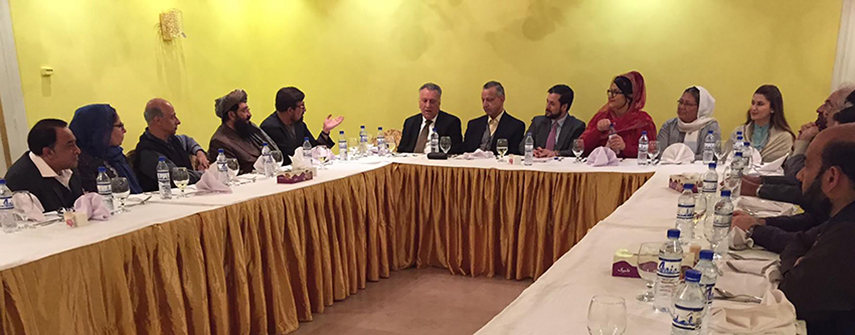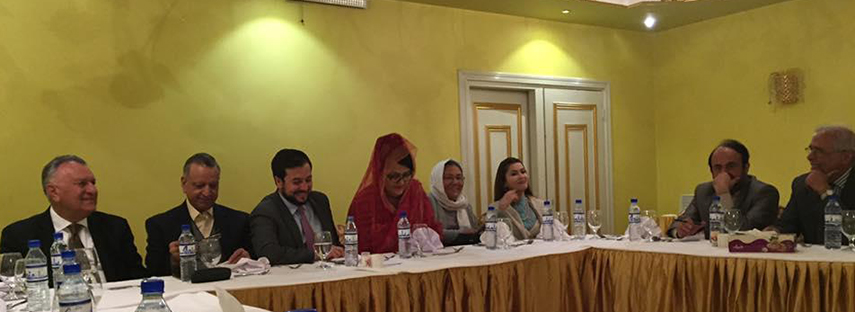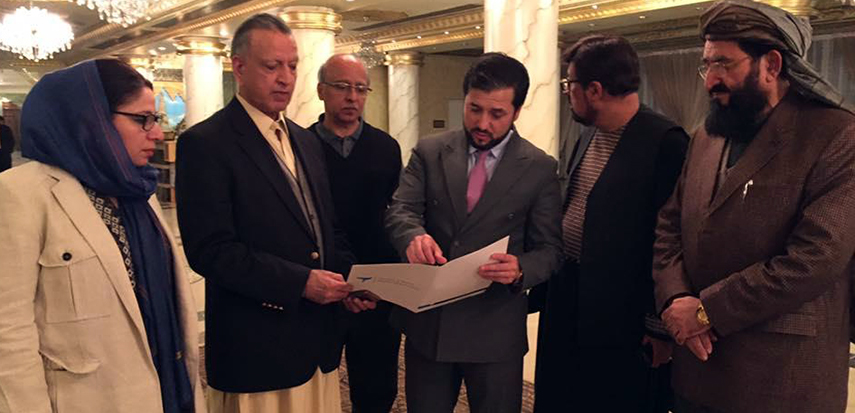The CRSS-WPSO track II Beyond Boundaries project’s Pakistan Afghanistan Joint Committee (PAJC) members from both the countries met with the Deputy Foreign Minister (M&R), Dr. Nasir Ahmad Andsha on Wednesday 16 November, 2016, at Intercontinental Hotel, Kabul.
The Pakistani side comprised Dr. Shoaib Suddle, former IG Police and federal tax ombudsman; Shazia Marri, Member of Parliament; Qazi Humayun, former ambassador; Mian Sanaullah, former ambassador; and Tahir Khan, senior journalist. The Afghanistan side included Khalid Pashtoon, Member of Parliament; Elay Ershad, Member of Parliament; Sayed Qutbudin Roydar, former deputy minister for parliamentary affairs; Mozammil Shinwari, former deputy minister for trade & commerce; Abdul Hakeem Mujahid, head of executive council of the High Peace Council; Palwasha Hassan, civil society leader; and Bilal Sarwary, senior journalist. Former Governor of Bamiyan province, and deputy chairperson of the High Peace Council, Habiba Sarabi also participated in the meeting.
Dr. Naseer Andisha welcomed the Pakistani and Afghan PAJC members, and appreciated the fact that despite all ups and downs the Beyond Boundaries track II dialogue has survived. He said he has with keen interest followed the previous six meetings of the first phase of Beyond Boundaries and have had the chance to read through some of the recommendations coming out of those. He added that such dialogues and engagement is very encouraging at people-to-people and civil society levels and it must continue.
Elay Ershad the member from Afghan side introduced the two delegations and the organizers, she gave a brief rundown of the previous six meetings under the first phase of the project, and the two meetings of PAJC held so far including the recent one in Mazar-e-Sharif on 14 November, 2016, where core issues of peace and security, refugees, trade, education and scholarship programmes, Pakistan funded projects in Afghanistan, and Media, Arts and Culture were discussed.
Dr. Andisha speaking to the two delegations said: “The process is slow but is commendable. It does create a bridge when officials stop talking. Hit me with talk instead of helping me or taking pity on me. I cannot agree more on areas of cooperation. This people to people series of dialogues is excellent but why can’t this be the case at other levels”, He agreed that there existed very severe differences, adding that antagonism is so evident on social media too. He also acknowledged that issuance of visas have become difficult, as a case in point he said If engineers working on road project don’t get visas they obviously would raise questions why? Afghanistan’s peace and prosperity is not possible without Pakistan and vice versa, the only way out is diplomacy. We need a bilateral consensus. Let me notionally say that sometimes even for bilateral issues we might need a third party inter-mediation, like World Bank or UN or OIC to help solve some of our problems. For example we had the Af-Pak envoy Richard Holbrook for signing APTA with Pakistan. World Bank can be helpful in water issues like Kabul basin- water treaty with Iran. Sometimes in bilateral disputes smaller countries feel like underdog. But, I firmly believe that sooner or later the peace process will sooner or later resume.
Andisha noted that media, arts and culture is an ideal opportunity to create more people-to-people contact and that this kind of group can pave the way for that. Sports and culture can be an overlapping interest; it can become a common ground for bringing youth together. Let me also tell you that the recent case of Sharbat Gula did not bode well for the long durable hospitality that Pakistan has offered to Afghan refugees: “it created a strong and negative impact here; Investment of 40 years should not be lost to a short sighted policy”.
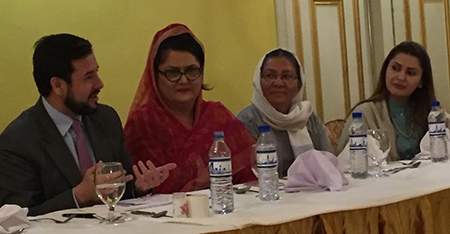 Abdul Hakeem Mujahid from the Afghan side was of the opinion that Pakistan can launch cricket diplomacy with Afghanistan. He said, I find great inclination for improving relations with Pakistan. When we were in Lahore and Islamabad last month for the first meeting of our group, we found Pakistani people and ministers very cordial. He added: “I am convinced that we should say what we have in our hearts for improving relations. There are three simple steps that we need to take: listen to each other; learn from each other; and respect each other”. He regretted the role of media saying that media creates lots of negative noises.
Abdul Hakeem Mujahid from the Afghan side was of the opinion that Pakistan can launch cricket diplomacy with Afghanistan. He said, I find great inclination for improving relations with Pakistan. When we were in Lahore and Islamabad last month for the first meeting of our group, we found Pakistani people and ministers very cordial. He added: “I am convinced that we should say what we have in our hearts for improving relations. There are three simple steps that we need to take: listen to each other; learn from each other; and respect each other”. He regretted the role of media saying that media creates lots of negative noises.
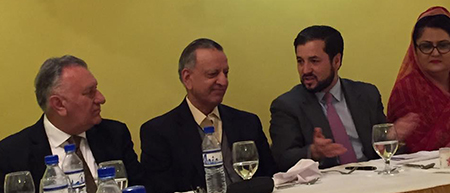 Shoaib Suddle speaking on behalf of the Pakistani delegation, said: “First of all let me thank you for taking time out and accommodating your schedule to meet with us for this working dinner. I agree with the minister. We should stop the blame game. We have had very useful and productive meetings here today with the Chief Executive, the Minister of Refugee and Repatriation, I must appreciate and acknowledge that the general tone has been conciliatory”.
Shoaib Suddle speaking on behalf of the Pakistani delegation, said: “First of all let me thank you for taking time out and accommodating your schedule to meet with us for this working dinner. I agree with the minister. We should stop the blame game. We have had very useful and productive meetings here today with the Chief Executive, the Minister of Refugee and Repatriation, I must appreciate and acknowledge that the general tone has been conciliatory”.
At the end of the meeting, on behalf of both the PAJC groups, Dr. Suddle shared and presented the policy recommendations formulated during this second meeting held at Mazar-e-Sharif.

